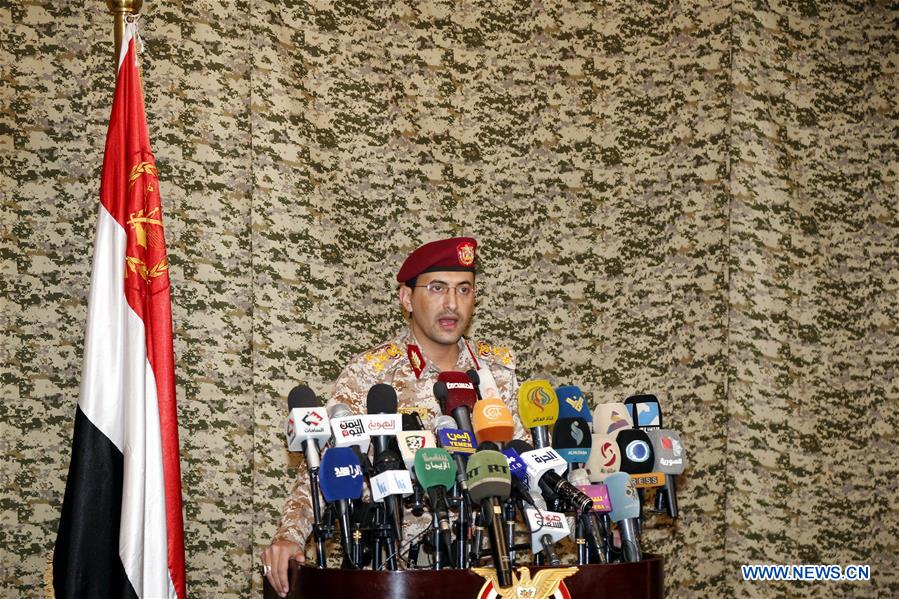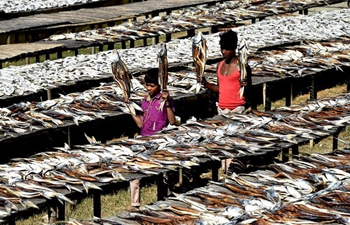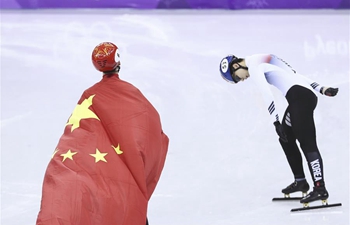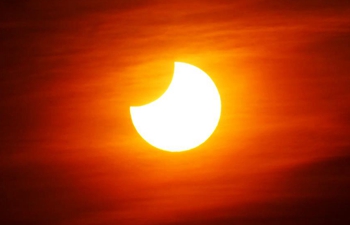
Spokesman of the Houthi militias Yahya Sarei speaks during a press conference in Sanaa, Yemen, on Jan. 8, 2019. Yemen's rival forces on Tuesday accused each other of being reluctant to implement a UN-brokered cease-fire and peace agreement reached in Stockholm last month, just a day after a brief visit by the UN special envoy to rebel-held capital Sanaa. (Xinhua/Mohammed Mohammed)
SANAA, Jan. 8 (Xinhua) -- Yemen's rival forces on Tuesday accused each other of being reluctant to implement a UN-brokered cease-fire and peace agreement reached in Stockholm last month, just a day after a brief visit by the UN special envoy to rebel-held capital Sanaa.
"Stockholm peace deal has stalled," government-run Saba news agency quoted Yemeni Foreign Minister Khaled Al-Yamani as telling the ambassadors of Group 18 countries (G18) which backs peace process in Yemen in a meeting on Tuesday in the Saudi capital Riyadh.
Al-Yamany counted dozens of breaches to the cease-fire deal which "were committed by the Houthi rebels in the Yemeni Red Sea port city of Hodeidah."
"The rebels have re-stationing inside the city and its ports, digging trenches, erecting barriers as they have exploited the truce to boost their military positions in Hodeidah," Al-Yamany told the ambassadors.
"Stalemate would affect the preparations to hold the next round of peace talks," Al-Yamany said, urging the United Nations and the ambassadors to press on the Houthi rebels to implement the Stockholm peace deal.
Saba news agency has not published reports specifying the recent number of rebels' breaches of the ceasefire, but it recorded 138 breaches during Dec. 18-23, 2018 and 14 breaches on Dec. 31, 2018.
Meanwhile, Saba cited a statement by the Saudi cabinet on Tuesday as "blaming the Houthi rebels of being reluctant to implement the peace deal."
"The Saudi cabinet also accused the Houthi rebels of publishing false information and inaccurate data about the humanitarian crisis in Yemen," Saba reported quoting the Saudi statement as saying.
However, Spokesman of the Houthi militias Yahya Sarei on Tuesday accused the Saudi-backed government forces of "committing 1,924 breaches of the cease-fire agreement in Hodeidah province over the past 20 days."
At a press conference in Sanaa, Sarei showed alleged videos and aerial photos of what he alleged as "attacks, airstrikes and breaches of the cease-fire by the Saudi-led coalition and its ally forces in Hodeidah."
He said "dozens of human causalities and destructions to the civil buildings and factories caused by the coalition attacks in Hodeidah despite the truce."
On Monday, the United Nations Special Envoy to Yemen Martine Griffiths left rebel-held capital Sanaa after holding intensified meetings with the dominant Houthi group to cement the fragile cease-fire and push for peace progress.
During his two-day visit, Griffiths held a series of meetings with the Houthi leaders, including the rebel chief Abdulmalik al-Houthi and head of the group's highest revolutionary committee Mohammed Ali al-Houthi.
Griffiths' office has not released any statement to comment on his meetings. But Houthi media reported that the meeting discussed preparations to hold the second round of peace talks.
Mohammed Ali al-Houthi tweeted that "no date and place have been set yet for the next round of talks."
Al-Houthi said his group demand the pay of salaries to all state employees and "consider the refusal of paying the military and security institutions as the first step of an American conspiracy that seek to dissolve the Yemeni army and security institution as they did in a post-Saddam Iraq which we will never accept."
Griffiths is also due to meet with Yemeni President Abd-Rabbu Mansour Hadi and his government in the Saudi capital of Riyadh, according to a UN statement released on Friday.
Last week, the Houthi group said it began withdrawing from the Hodeidah ports in order to "implement the first phase of re-deployment."
In response, the UN said the redeployment "would only be credible if all parties and the United Nations are able to observe and verify that it is in line with the Stockholm agreement."
Under the truce, the withdrawal from the ports of Hodeidah, Salif and Ras Issa, and critical parts of the city associated with humanitarian facilities should be completed within two weeks after the cease-fire enters into force, while the full withdrawal should be completed within a maximum period of 21 days.
Saudi Arabia has been leading an Arab military coalition in Yemen against the Iran-backed Houthi militia since March 2015, in order to reinstate the exiled Yemeni government of Hadi.















